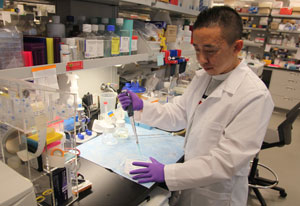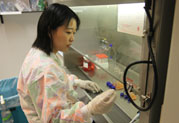US-Japanese collaborations yield results
October 2010 | Volume 9, Issue 5

Photo by Jeff Gray
Former Japanese fellow Dr. Atsushi Tanaka recently
contributed to a significant discovery related to
Parkinson’s disease and is continuing his research
at NIH.
U.S.-Japanese research collaborations not only provide scientists of both nationalities the opportunity to train in new areas but also spur discoveries that might not otherwise occur.
Japanese researchers can be found in NIH labs across campus, working alongside their American peers. Over the past 15 years, the Japan Society for the Promotion of Science (JSPS) has supported 220 Japanese Ph.D.s at NIH and provides a parallel opportunity for American researchers to collaborate with their counterparts in Japan. Last year alone, about 375 postdoctoral fellows and senior researchers from the U.S. traveled to Japan through various JSPS programs.
“Scientific research generates knowledge best when curiosity-driven researchers can challenge themselves,” says Professor Motoyuki Ono, JSPS president. “One way to encourage excellence is through the international exchanges we support. Together, Japanese and American scientists can advance cutting-edge research.”
Fogarty reviews both Japanese and U.S. applications and handles day-to-day issues at NIH. Dr. Keiko Ozato, deputy chief of the National Institute of Child Health and Human Development, chairs the selection panel. “These formal and informal arrangements with host NIH laboratories have a clear benefit to both parties,” she says. “The collaborations promote broader dissemination of scientific information, strengthen the international workforce and increase productivity.”
New fellow Dr. Junko Murai is at the National Cancer Institute, working in collaboration with Kyoto University to find chemical compounds that increase the effect of anti-cancer drugs. Hundreds of thousands of compounds must be tested to find the one that works best.

Photo by Jeff Gray
Increasing the effectiveness of
cancer drugs is Japanese fellow
Dr. Junko Murai’s goal for
research she’s conducting in an
NIH lab.
“The NIH Chemical Genetics Center has developed a great chemical screening system that can test the effects of hundreds of thousands of chemical compounds within a few weeks,” says Murai. “This system is unrivaled.”
Dr. Atsushi Tanaka, a fellow in 2008-2009, has remained at the National Institute of Neurological Disorders and Stroke. His work contributed to a significant discovery that’s causing a shift in understanding the molecular mechanism of Parkinson’s disease. Understanding the role of mitochondria, a cell’s energy source, is his focus.
Tanaka and his colleagues revealed the function of the Parkin protein, a key factor in the disease. Parkin detects dysfunctional mitochondria and helps eliminate them from cells. Scientists believe this activity is impaired in people with Parkinson’s disease.
“My research has two goals,” says Tanaka, who‘s contributed to six journal articles on the subject and was lead author on three. “One is clinical applications, such as gene therapy, for people with Parkinson’s and related diseases. Second is advancing mitochondrial biology.”
Tanaka and other fellows appreciate being at NIH, where they have the opportunity to meet and work with accomplished researchers from all over the world.
Fifteen Japanese researchers are chosen annually for two-year fellowships at NIH, with all expenses paid by JSPS.
More Information
To view Adobe PDF files,
download current, free accessible plug-ins from Adobe's website.
Related Fogarty Programs
Related World Regions / Countries